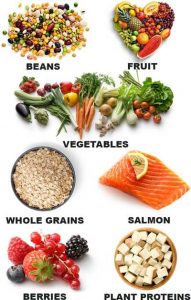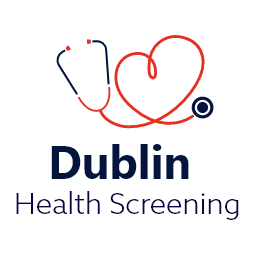At Dublin Health Screening
What is a cholesterol test?
A cholesterol test is a blood test that measures your total blood cholesterol level and its components, which include:

- high-density lipoprotein (HDL) cholesterol – ‘good cholesterol’
- low-density lipoprotein (LDL) cholesterol – ‘bad cholesterol’
- triglycerides
- total cholesterol
- total cholesterol/HDL ratio.
Together, the results are known as your blood lipid profile. Lipids are just another name for the fatty substances in the body and bloodstream. Note we ask you to fast for 12 hours before hand, having no breakfast, you also have to avoid tea and coffee but you can drink as much water as you want.
Why is it useful?
The cholesterol test is not used to diagnose a disease. Instead, measuring cholesterol and knowing the levels of these lipids provides important information on your health and your long-term risk of heart disease and stroke. Together with other cardiovascular risk factors (such as blood pressure, and bodyweight), your cholesterol results can give us an overall picture of your health.
If the blood test results are not within normal limits, this ‘early warning’ allows you to make lifestyle changes and consider treatments to lower your future risk of heart attack and stroke. Making changes on the advice of our doctors can greatly alter your risk.
How is it carried out?
Some cholesterol tests can be conducted with a finger-prick blood sample, but more detailed testing requires a blood sample collected from a vein in the arm. You will need to fast (go without food and most drink apart from water) for a specified period (usually at least 12 hours) before taking the test. You should still be allowed to drink water and take your normal medications – do not stop taking these unless your doctor advises you to (eg, if the medications would interfere with the test result).

Top 30 Cholesterol Lower Foods Dublin Health Screening
1 Oats and oat bran – Oats is a cholesterol buster. One of its component’s beta-glucan, helps in absorbing LDL (the bad cholesterol) which the body then excretes. According to the studies, as little as 3 grams of soluble oat fibre daily, present in one bowl of oatmeal, can reduce total cholesterol by 8-23 per cent in people who are suffering from high cholesterol issues.
2 Beans and legumes – Beans like kidney beans (rajma), bengal Gram (chana) and chick peas (kabuli chana), are rich in dietary fibre which help in reducing cholesterol level and thus, can prevent the rise of blood sugar levels.
3 Avocados – Rich in vitamin K, C, B5, B6, E, potassium and folate, along with a small quantity of magnesium, manganese, copper, iron, zinc, phosphorus, vitamin A, B1 (Thiamine), B2 (Riboflavin) and B3 (Niacin), protein, avocados are low-carb plant food. They keep a healthy blood pressure which is a solution for a lot of problems, one of them being cholesterol.
4 Nuts – Studies have shown that eating a whole walnut daily, for a month helps in lowering cholesterol by 5.4 per cent and LDL cholesterol by 9.3 per cent. Almonds and cashews are other good options for treating cholesterol.
5 Barley and other grains – Like oats, barley and other whole grains lower the risk of heart diseases, because of the soluble fibre they deliver. Barley also controls triglyceride level and regulates blood sugar level.
6 Eggplant and okra – These two low-calorie vegetables are good sources of soluble fibre and fibre is essential to control cholesterol level in the body.
7 Fruits – Fruits are a boundless source of nutrients, vitamins, minerals and fibre. Fruits such as pear, apples, oranges, berries, grapefruit and pomegranate have the necessary nutrients and components that aid in reducing the cholesterol level in the blood. It is also because their high fibre content help in reducing cholesterol level.
8 Soy – Soy, also known as soyabeans, have the ability to improve the metabolism, help gain healthy weight, protect heart, defend against cancer. It also reduces the effect of menopause, improves digestive health, promotes bone health, protects against birth defects, increases circulation and decreases the risk of diabetes. Its products like tofu, nuggets, Nutella, soy nuts and unflavoured soy milk help to lower cholesterol levels in the blood. It is a great substitute of the animal protein for the vegetarians as it lowers the level of total cholesterol, bad LDL cholesterol, and triglycerides without lowering HDL (good) cholesterol levels.
9 Fatty Fish – Fish is high in omega-3 fatty acids and protein. The omega-3 fatty acid in fish when consumed, reduces the triglyceride level by as much as 25-30 per cent while increasing the level of high-density lipoproteins (HDL) that are good for heart health.
10 Olive oil – Vegetable oils are also beneficial and useful in lowering cholesterol levels in the body. Using oils such as sunflower and other varieties, in place of butter in cooking or at the table help in lowering LDL.
11 Rice bran oil – With the balance of polyunsaturated fats (PUFA) and monounsaturated fats (MUFA), rice bran oil is one of healthiest cooking oils. As it contains the right amount of oryzanol, which is an antioxidant, rice bran oil thus decreases cholesterol absorption and increases our body’s ability to eliminate excess cholesterol.
12 Tomatoes – Rich in vitamins and minerals, tomatoes are good for hydration, to stimulate blood circulation, increase red blood cells and platelets and even fight against different forms of cancer. It detoxifies the body, reduces cholesterol, increases digestion, improves eyesight and provides relief from various skin problems.
13 Fenugreek seeds – Fenugreek seeds, or more commonly known as Methi seeds, have the ability to lower total cholesterol, LDL (bad cholesterol) and triglyceride level in the blood. According to the studies conducted, it is seen that the regular consumption of fenugreek seeds are also effective in controlling blood sugar level in people with diabetes.
14 Lemons – Lemon juice is a great way to consume vitamin C every day. Drinking lemon juice daily reduces the level of LDL, or “bad,” cholesterol in the body. Lemon Juice is one of the best natural cleansers because of its high citric acid content. The best time to drink lemon juice is in the morning, just after getting out of the bed. Drinking lemon juice on an empty stomach every day keeps your body healthy and free of impurities.
15 Ginger – Ginger is the best solution for healthy stimulation and increases blood circulation. While during winter, it keeps us warm and helps in getting rid of throat infections. Ginger is also rich in good enzymes and natural oil which reduces the level of bad cholesterol from the body.
16 Garlic – As garlic is known for its antibiotic properties, it should be mixed with food after chopping or crushing for better absorption of its nutrients.
17 Ispaghula husk – Also known as Psyllium, Ispaghula husk is a dietary fibre mainly consumed to get relief from the symptoms of both constipation and mild diarrhoea. It is also sometimes used as a food thickener. Studies have shown that ispaghula benefits in reducing blood cholesterol level.
18 Green Tea – Green Tea is one thing that can be found in almost every household and is a natural medicine to aid digestion. It also improves heart and mental health and regulates body temperature.
19 Coriander – Coriander seeds are very useful in lowering the cholesterol level. The best way to consume coriander is by boiling two tablespoons of coriander seeds in a glass of water, strain the decoction after cooling and drink it twice a day for effective results.
20 Cluster beans – Cluster beans, also known as Guar beans, which are a rich source of dietary fibre (guar gum). It is beneficial in lowering cholesterol level.
21 Cinnamon – Even half a teaspoon of cinnamon a day significantly reduces the blood sugar level, triglycerides and LDL (bad) cholesterol in people suffering from type 2 diabetes
22 Celery – Celery has a high antioxidant content and thus, it is known to lower the risk of heart disease by preventing oxidation of LDL (bad) cholesterol.
23 Broccoli and other vegetables – Broccoli contains cholesterol-lowering properties. The fibre in broccoli lowers cholesterol by binding with bile acids in the digestive tract and excreting it out of the body.
24 Apple cider vinegar – Apple cider vinegar is an excellent health tonic promoted for treating allergies, rashes, and infections and for aiding digestion and promoting weight loss. Vinegar maintains the pH level in the body and has a rich amount of potassium and enzymes which also helps in making a healthier body.
25 Brown Rice – Brown rice is the unpolished form of rice that retains most of its fibre and nutrient content that is otherwise removed from refined, white or polished rice. The brown rice is rich in nutrients including B vitamins, selenium, magnesium and phytonutrients.
26. Red Wine.
27 Dark Chocolate
28 Flax Seeds
29. Foods with added sterols and stanols, Flora Proactive spreads and drinks and the Benecol range.
30. Cut all Salt out of the diet and avoid processed food with salt, eg soup and bread.
Dr John J Ryan
